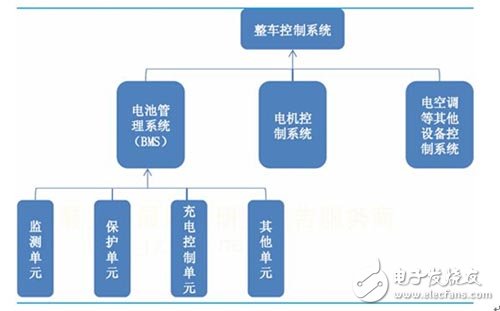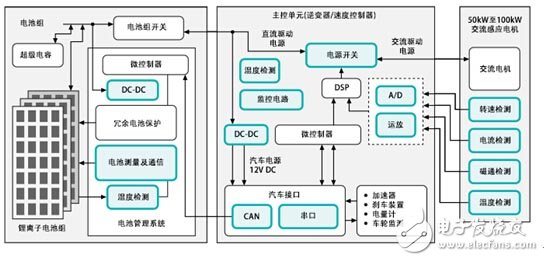As a real-time monitoring, automatic equalization, intelligent charging and discharging electronic components, the battery management system (BMS) plays an important role in ensuring safety, extending life and estimating remaining power. It is an indispensable component in power and energy storage battery packs. It guarantees the normal operation of electric vehicles through a series of management and control.
The biggest difference between new energy electric vehicles and traditional fuel vehicles is the use of power batteries as the power drive, and as an important link between battery packs, vehicle systems and motors, the importance of battery management systems (BMS) is self-evident. As a real-time monitoring, automatic equalization, intelligent charging and discharging electronic components, the battery management system (BMS) plays an important role in ensuring safety, extending life and estimating remaining power. It is an indispensable component in power and energy storage battery packs.

Electric vehicle control system diagram
Many new energy auto companies at home and abroad regard the battery management system (BMS) as the core technology of the enterprise. In the "three big parts" of Tesla's electric vehicles, the batteries come from Panasonic and the motors come from Taiwan. The supplier, and only the battery management system (BMS) is the core technology of independent research and development. The core intellectual property rights applied by Tesla during the period of 2008-2015 are mostly related to the battery management system, which shows that the battery management system is for new energy. The importance of the car.
Battery Management System (BMS) Market
With the growth of new energy vehicle sales, the market size of battery management systems has grown rapidly. At present, vigorously developing new energy vehicles has become the consensus of all countries. Major countries such as the United States, China, Japan, Germany, South Korea, and the United Kingdom have all established their own plans for the new energy automobile industry.
In 2013, the global battery management system (BMS) market grew by more than 10%, and the growth rate will jump to 25-35% from 2014 to 2016.
In 2015, the annual global sales of electric vehicles is expected to exceed 1 million units, and the battery management system (BMS) market will reach approximately 20 billion yuan. If the hybrid vehicle is considered, the total market size of the battery management system (BMS) is expected to reach 40 billion yuan. It can be seen that the battery management system (BMS) has a broad market space.
According to the plan, by 2020, the production capacity of China's pure electric vehicles and plug-in hybrid vehicles will reach 2 million units, and the cumulative production and sales volume will exceed 5 million units. The market size of China's battery management system (BMS) is also expected to reach 36 billion in 2020. Above yuan.
Regardless of whether automotive OEMs, battery manufacturers and auto parts suppliers have entered the battery management system (BMS) technology research and development, they have sought to master the key core technology of electric vehicles, foreign auto parts suppliers Denso (DENSO), Bosch (BOSCH) has already seized the opportunity in the supply chain status of the OEM, Denso provides battery management system for Toyota electric vehicles, and Bosch provides battery management system for BMW electric vehicles; while battery manufacturer LGC is not far behind, respectively Work with GM, Ford, and Volvo to provide battery management systems.
The technical research and development of domestic battery management systems is mainly concentrated in these three types of enterprises:
1. New energy automobile manufacturers, on behalf of enterprises: BYD, Beiqi New Energy
2, battery manufacturers, on behalf of enterprises: CATL, Waterma, Pride, Xinwangda, etc.
3, professional battery management system (BMS) manufacturers, on behalf of enterprises: Junsheng Electronics, Huizhou billion, Anhui Ligao, Shenzhen Ke Lie Technology, Shenzhen Guoxin Power, Hangzhou Jeneng Power, etc.
In the past two years, the new energy automobile industry has entered the growth period from the introduction period. The foreseeable huge market prospects have attracted various capitals to enter various sub-sectors such as new energy vehicles, power batteries, BMS, materials and equipment.
Battery management technology has also received much attention in China. Many professional manufacturers, power battery companies and vehicle manufacturers have begun to engage in research and production in this area. Currently, there are at least one hundred, but many domestic battery management system (BMS) manufacturers. Most of them are private enterprises, and the market has shown a very competitive situation. Some companies have mastered advanced battery management system technologies, such as Joyson Electronics, through their own research or acquisitions; while some companies have only been able to develop low-end battery management systems (BMS) products, and battery management systems (BMS) The choices are also different, which brings development opportunities for the majority of battery management system (BMS) manufacturers. At the same time, with the increasing number of battery management system companies and the upgrading of technical requirements, the battery management system (BMS) industry has Further shuffling requirements.
Domestic Development Battery Management System (BMS) recommends:
Technical parameters and standards first
At present, due to the lack of technical parameters and standards in China or behind the international standards, there is no authoritative organization to conduct an authoritative test on the battery management system (BMS) produced. This is a dilemma in the domestic battery management system (BMS) market, resulting in a battery management system. (BMS) products are mixed. The battery management system (BMS) system is a product related to driving safety. Standardized management is still necessary. It is more advantageous to regulate the industry as soon as possible. At the same time, domestic authorities also need to determine the authoritative testing organization to conduct standardized testing of products.
Accelerate the localization of core components
Although there are many battery management system (BMS) companies in China, many companies have mastered the core algorithms of battery management systems, but in core components such as microcontrollers (MCU), battery measurement and communication ICs, etc., mainly rely on imports. . There is no doubt that the chip will build the core competitiveness of the future car, regardless of traditional cars or new energy vehicles.
Chen Guangzu, a senior expert in the automotive industry, said recently that "in the new normal development situation, the lag in the development of automobile chips has formed a 'core cut' for the transformation and upgrading of the automobile industry. The development of automobile chips may be an opportunity for the automobile industry to get rid of people."
Maxim Battery Management System (BMS) Solution

Summary: The safety of new energy vehicles has always been one of the key tasks of the automotive industry. While looking forward to the rapid development of new energy vehicles, we must recognize that stable, efficient, safe and reliable battery management system (BMS) products It is the key to ensuring the normal operation of electric vehicles. Only in this way can China's new energy vehicles have a sustainable future.
5050 Single Color Led Strip ,Single Color Led Strip,Single Color Led Strip Lights,Single Colour Led Strip
NINGBO SENTU ART AND CRAFT CO.,LTD. , https://www.lightworld-sentu.com
